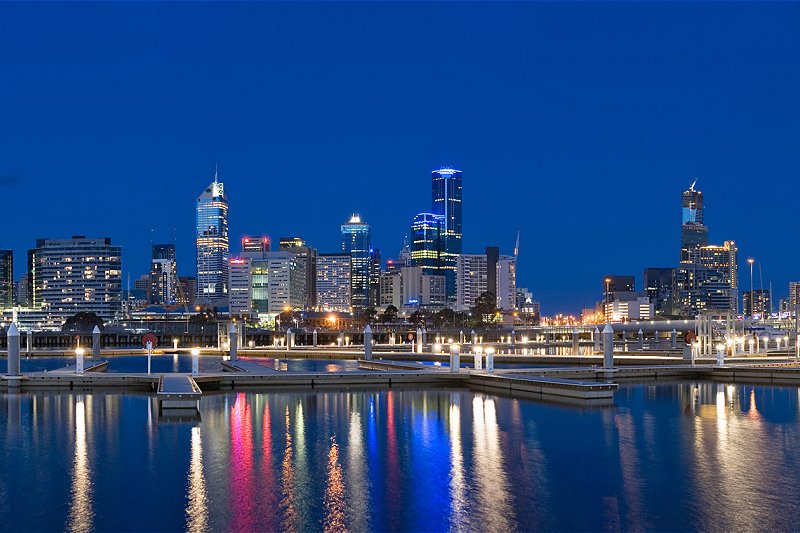 View of the Melbourne skyline from Yarra's Edge in the Docklands
View of the Melbourne skyline from Yarra's Edge in the DocklandsSource: https://commons.wikimedia.org/wiki/File:Melbourne_Docklands_-_Yarras_Edge_-_marina_panorama.jpg
Author: David Iliff

Melbourne is the capital and biggest city in the state of Victoria. It is also the second biggest city in Australia after Sydney. The Melbourne metropolitan area has a population of about 4 million people. It is located on a large natural bay called Port Philip, at the estuary of the Yarra River.
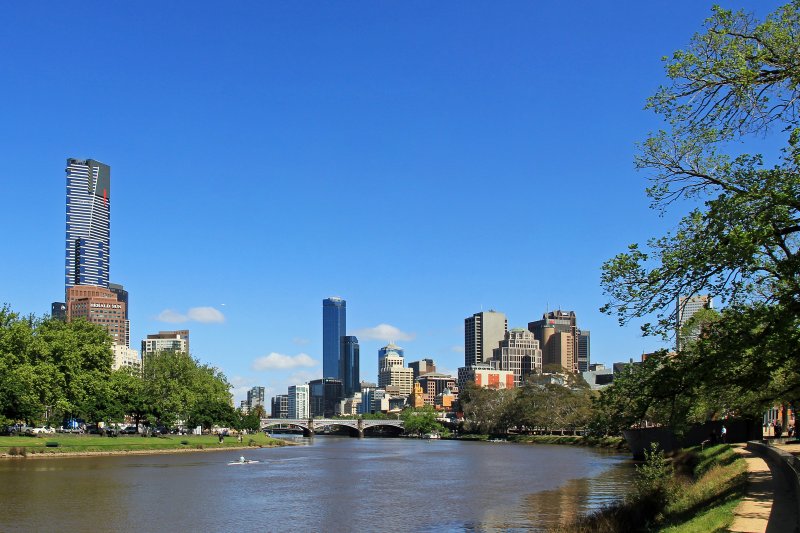 View of the Yarra River from Alexandra Gardens in Melbourne
View of the Yarra River from Alexandra Gardens in MelbourneSource: https://commons.wikimedia.org/wiki/File:Melbourne_Yarra_River.jpg
Author: Donaldytong

Melbourne was founded in 1835. The name Melbourne was given in 1837 in honour of William Lamb, the 2nd Viscount Melbourne. It was granted city status by Queen Victoria in 1847. By the mid 19th century, Melbourne grew rapidly, becoming one of the biggest and richest cities of the world, thanks largely to a gold rush. It served as the interim capital of Australia between 1901 and 1927.
Today Melbourne is a cosmopolitan city that is the centre of the arts, commerce, entertainment and tourism in Victoria. The city has the largest tram network in the world.
Melbourne on Google Maps Street View
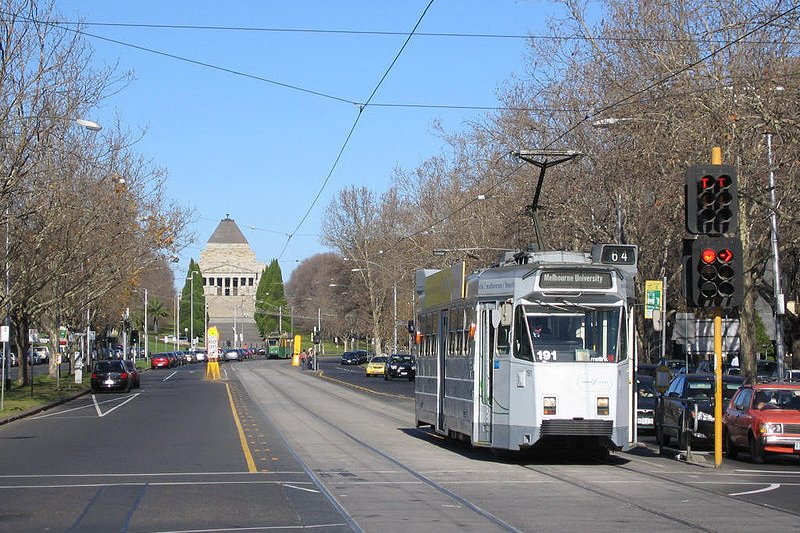 A Tram going along St Kilda Road in Melbourne
A Tram going along St Kilda Road in MelbourneSource: https://commons.wikimedia.org/wiki/File:St-kilda-road-melbourne.jpg
Author: Marcus Wong

Travel to Melbourne
Melbourne Airport (MEL) is the main airport for the city. Also known as Tullamarine Airport, it is the second busiest airport in Australia. The airport is located 23 kilometers (14 miles) from downtown Melbourne. Among the low-cost carriers that is based at Melbourne include Jetstar and Tiger Airways.Melbourne Airport has four terminals, the first three within the same building while Terminal 4 is within walking distance. Terminal 2 is the international terminal while the rest are for domestic flights. Arriving at Melbourne Airport, you have a choice of airport bus (called Skybus) or taxi to reach Melbourne. The Skybus picks up passengers at Terminal 2 and Terminal 3. Tickets are available from both terminals. The journey to Melbourne takes 20 minutes if the traffic is smooth. One way ticket costs A$16.00. The same journey by taxi will cost you A$40-A$45.
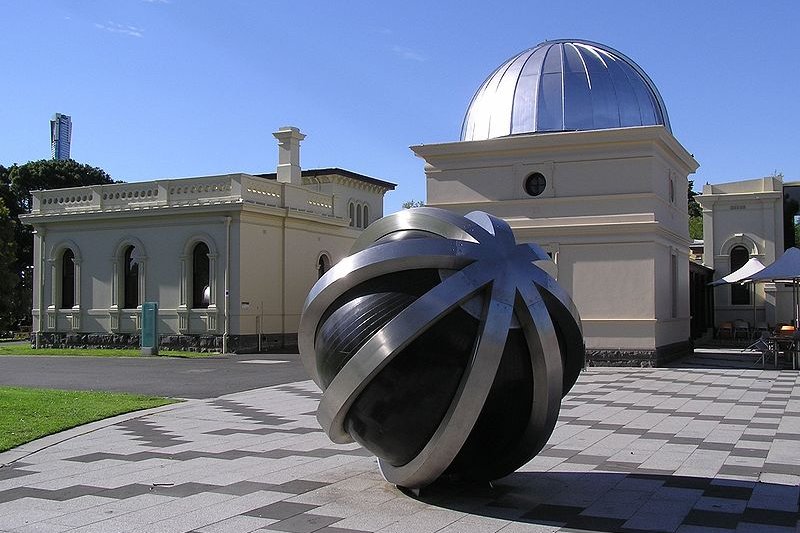 Sculpture in the forecourt of the Melbourne Observatory
Sculpture in the forecourt of the Melbourne ObservatorySource: https://commons.wikimedia.org/wiki/File:Melbourne_Observatory_Cafe_%26_The_Gardens_Shop_%28Art_Sculpture%29.jpg
Author: Donaldytong

Travel within Melbourne
Although Melbourne is a sprawling city, most of the tourist attractions are found around the Central Business District and its vicinity. The transportation authority for Melbourne is Metlink. It manages the buses, trains and trams in Melbourne.You pay for your rides all the buses, trains and trams using a magnetic-strip Metcard and the new smart-card version called Myki. At the moment, Metcard predominates. The city is divided into zones. If you intend to use the public transport for a visit of less than 5 days, I suggest you you get the daily pass for A$6.80, allowing you unlimited rides. Otherwise, a single ticket is valid for a two-hour period, and you can use it to transfer from one transport to another within that period.
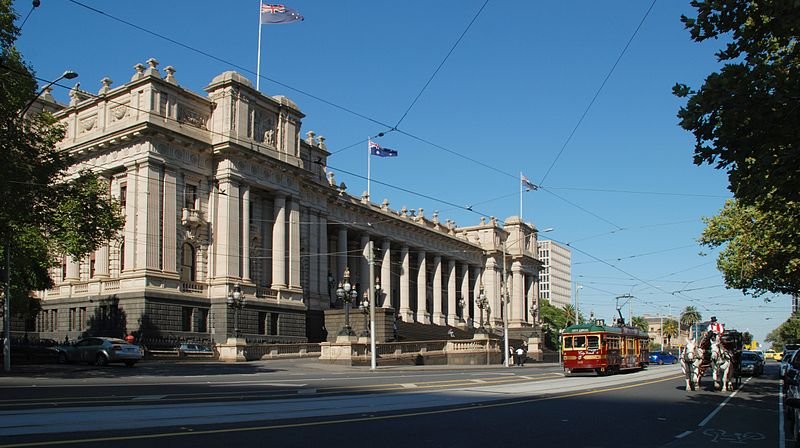 The Parliament House of Victoria in Melbourne
The Parliament House of Victoria in MelbourneSource: https://commons.wikimedia.org/wiki/File:Parliement_House_Melbourne_2010.jpg
Author: Elekhh

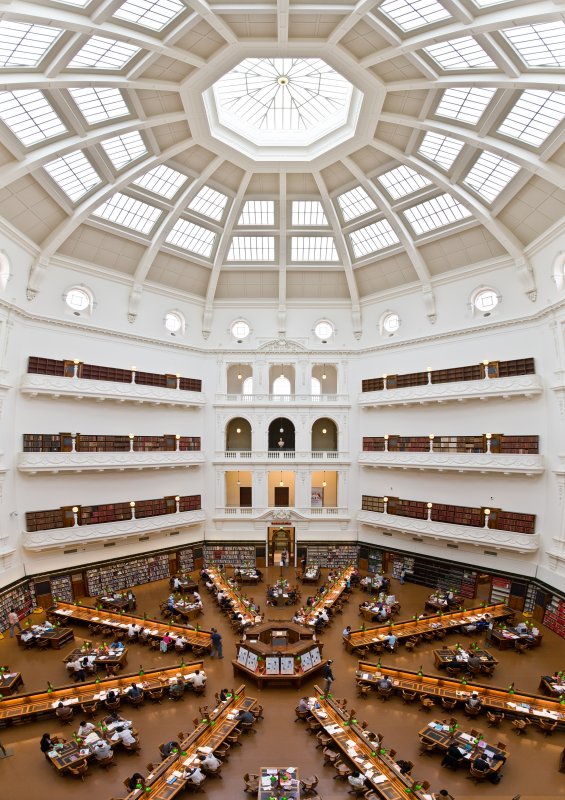 La Trobe Reading Room at the State Library of Victoria in Melbourne
La Trobe Reading Room at the State Library of Victoria in MelbourneSource: https://commons.wikimedia.org/wiki/File:State_Library_of_Victoria_La_Trobe_Reading_room_5th_floor_view.jpg
Author: David Iliff

 Places of Interest in Melbourne
Places of Interest in Melbourne
- Queen Victoria Market
The main produce market of Melbourne sited on what was formerly the city cemetery. - St Francis' Church
The busiest Roman Catholic church in Australia. - Supreme Court Building of Melbourne
Supreme court with a history dating back to the arrival of Melbourne's first resident judge in 1841. - Royal Mint
Historical building that was completed in 1872 to process the ore from the Victorian gold rush. - St James' Old Cathedral
The first Anglican cathedral of Melbourne. - Rialto Towers
58-storey skyscraper, the second tallest in Melbourne, with the fastest elevator. - Melbourne Docklands
Redeveloped dock area that is now a recreational precinct. - Melbourne General Post Office
Historical building completed in 1907. - Royal Arcade
The oldest surviving arcade in Melbourne, dating to 1869. - Block Arcade
The most opulent arcade in Melbourne, built between 1891 and 1893. - Melbourne Town Hall
Historical civic building from 1870. - St Paul's Cathedral
Cathedral church of the Anglican Diocese of Melbourne. - Regent Theatre
Public theatre which was built in 1929, damaged by fire in 1945, and rebuilt in 1947. - Scot' Church
Historic building intended to be the 'most beautiful building in Australia', completed in 1874. - No. 120, Collins Street
Skyscraper in Melbourne. - Eureka Tower
300-meter, 91-storey residential skyscraper in Melbourne. - Chinatown
Chinese enclave created by immigrants that landed in Australia since 1818. - Museum of Chinese Australian History
Museum showcasing the heritage of Australians of Chinese descent. - Parliament Area
Historic area on Eastern Hill with numerous historical buildings. - Old Magistrates's Court
Civic building that used to house the city courts of Melbourne until 1995. - Old Melbourne Gaol
The first extensive prison in Victoria. - Lygon Street
Cafe and delicatessen street in Melbourne, with a distinct Italian character. - Melbourne Museum
One of the newest museums in Melbourne with displays on science, technology, the environment, human mind and body, Australian society and indigenous cultures. - Brunswick Street and Fitzroy
A neighbourhood with a Bohemian character, lined with cafés, restaurants and specialty shops. - City Museum
Museum housed in the 19th-century Old Treasury Building. - National Sports Museum
Museum located at the Melbourne Cricket Ground celebrating all forms of sports in Australia. - Melbourne Cricket Ground
The premier sports stadium in Australia. - Melbourne Park
Formerly called the National Tennis Centre, this is a sports facility and concert venue. - Royal Botanic Gardens and Kings Domain
Two adjoining gardens established in 1852 to form the green heart of Melbourne. - Yarra River
240-km river that empties into the sea in Melbourne, dividing the city north and south. - Melbourne Maritime Museum
Museum housing the 1885 barque called Polly Woodside. - Melbourne Aquarium
Aquarium showcasing the marine life of the southern oceans. Its highlight is a 2.2-million liter Oceanarium. - Flinders Street Station
Central metropolitan train terminus for Melbourne, completed in 1910. - Federation Square
Public square opened in 2002 to commemorate the centenary of the federation of Australian states. - National Gallery of Victoria
The first public art gallery in Australia, opened in 1861. - St Kilda (Fitzroy and Acland Street)
Beachside neighbourhood of Melbourne. - Albert Park
Centrepiece of a 225-hectare parkland with facilities for sports and other forms of recreation. - Chapel Street
The most fashionable street in Melbourne, with branded stores and international design labels. - Rippon Lea
Mansion built in 1868 that once belonged to Premier Sir Thomas Bent. - Como Historic House and Garden
19th century residence with fine collection of its origianl furnishings.
Back to Discover Australia
 Latest updates on Penang Travel Tips
Latest updates on Penang Travel Tips

Copyright © 2003-2025 Timothy Tye. All Rights Reserved.

 Go Back
Go Back